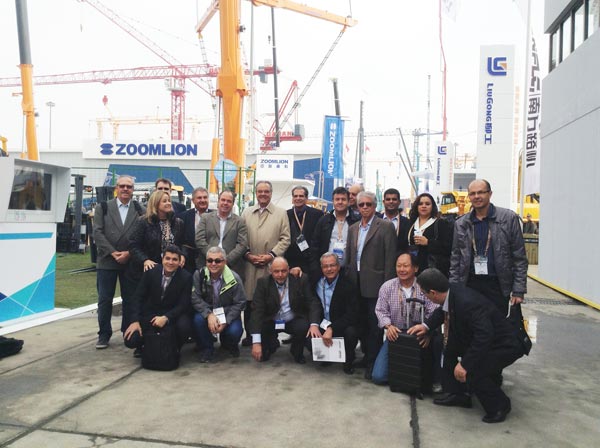Chinese heavy machinery lifts Brazil
 |
|
For the first time in their history, the Industry Federation of the State of Rio de Janeiro (FIRJAN), one of five FIRJAN System organizations that provide services to more than 8,000 companies and 104 unions in Rio de Janeiro, sent a 12-member delegation to Shanghai's Bauma China 2014, Nov 25 to 28, in order to strike up relationships with more Chinese companies. Photo provided to China Daily |
Brazilian construction entrepreneurs are looking to buy more machines from China, in a bid to compensate for construction labor shortages and speed up business growth.
For the first time in their history, the Industry Federation of the State of Rio de Janeiro (FIRJAN), one of five FIRJAN System organizations that provide services to more than 8,000 companies and 104 unions in Rio de Janeiro, sent a 12-member delegation to Shanghai's Bauma China 2014, Nov 25 to 28, in order to strike up relationships with more Chinese companies.
The delegation looked at construction-related machines such as elevators, cranes and block makers and spoke with companies about further cooperation. FIRJAN said all its members were union representatives in Brazil and would share the information they gathered on their return.
FIRJAN's president Eduardo Eugenio Gouvea Vieira said that China had higher efficiency in building infrastructure facilities in recent decades, so by cooperating with Chinese companies Brazilian companies could achieve faster speeds and lower costs.
"The construction sector in Brazil is looking for industrial upgrades and we need more machines to do the work," said Vieira. "We want to use technology to improve the process."
Vieira noted that that labor shortages and increasing labor costs were forcing construction companies to use more machines in Brazil to accelerate construction.
Roberto Kauffmann, vice-president of FIRJAN, said the monthly labor cost per person was about $2,000 in Brazil, an increase of about 40 percent over 2004 levels of $1,600.
"We are buying machines to lower labor costs and improve work efficiency," said Mauro Campos, president of Aceplan construction, a company responsible for building 1,500 affordable apartments for locals in the next few years.
Compared to foreign brands from the US, Japan and German, China's machines are said to achieve similar results at much lower costs and premium quality, according to company representatives.
Marcelo Kaiuca, director of construction company Multibloco , said he bought a machine to make blocks for $996,665 in 2012 and a similar machine only costs $450,000 from China today.
"If I want to buy more machines, I will choose a Chinese company," said Marcelo. "The functions are quite similar but the costs are much lower."
Specifically designed machines from China can also help companies enter new markets.
"We are expanding into other businesses so we buy machines to do tasks which cannot be done manually," said Regina Lucia, president of Brazilian construction company Minerações Montes Claro.
Montes Claro needs to extract sand from mines and Lucia put an order in to China's Sany Heavy Industry Co for a machine to grind up sand, which will also help the company expand into glass manufacturing.
Even though the growth of Brazil's economy has been slowing in recent years, the construction sector has had better results than most other sectors.
The overall growth rate of construction businesses was 47.1 percent between 2003 and 2013, compared to 45.9 percent growth for Brazil's overall economy.
Figures from the Ministry of Labor and Employment showed that the unemployment rate in Brazil was 4.7 percent in October 2014, while the construction sector's unemployment rate was 2.8 percent.
The increasing demand for machinery in Brazil offers opportunities for Chinese machinery giants like Sany and Zoomlion.
Vieira said both state-owned businesses and private businesses from China were welcome to partner with Brazilian companies to achieve win-win results.
Sany Brazil has been an important supplier of construction machinery and equipment since 2007.
"Many companies in Brazil are using Sany products," said Lucia. "I had Sany recommended to me."
The construction industry in Brazil has been traditionally dominated by US, German and Japanese enterprises. However, Chinese companies have managed to access the Brazilian construction machinery market by controlling costs and providing innovative technologies that better meet clients' demand.
The 2014 FIFA World Cup and 2016 Olympic Games have provided an unprecedented boon not only to Brazil's construction equipment market, but also to Chinese companies. In 2013, Brazil became the largest importer of Chinese truck cranes, totaling $140 million.
tangzhihao@chinadaily.com.cn


















